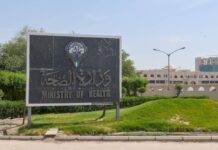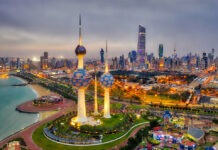The National Library of Kuwait is an imposing structure that houses more than half a million books, 3,000 original manuscripts and thousands of photographs, making it the largest library in the region, revealed Kamel Al Abdul Jalil, the general manager of the library in an exclusive chat with The Times.
Sitting in his office overlooking the Arabian Gulf, Abdul Jalil spoke enthusiastically and with pride on the beautifully designed architecture of the building in the heart of Kuwait City, and how it contributes significantly to the preservation of Kuwait’s history and heritage.
The history of the library dates back to 1923, when it was established by Kuwaiti individuals as a place to gather and gain information. Due to its increasing popularity with the public, the government took over the institution in 1937 and named it as Library of Public Information.
For the next 40 years, the library served the cultural and intellectual needs of the citizens, preserving valuable books on all subjects ranging from Arabic literature to science and history. In 1979, the library was brought under the aegis of The National Council for Culture, Arts and Letters (NCCAL) and it was renamed as the Central Library. By this time. It had grown to encompass over 50,000 books as well as 6,000 periodicals and a large number of rare manuscripts.
In 1994, the late Amir Sheikh Jaber Al Ahmad Al Sabah issued a decree to establish the National Library of Kuwait making it the first and leading National Library in the Gulf peninsula.
Abdul Jalil disclosed that the library building is divided into 8 sections that houses books on Children and Youth, the Special needs (blind) section, government publications, a section with United Nations publications, a section where Kuwaitis have donated their personal libraries filled with important and rare publications. More than 18 people have generously donated their collections which are helpful for research students and are maintained by the library. An audio visual section and a periodical section are also part of the National Library.
“We strive very hard to ensure that the library maintains its role as a centre for scientific, creative and literary knowledge,” said Abdul Jalil. He added that the library has activities throughout the year, from children’s workshops, to new book launches in their spacious 275-seater auditorium; the library cooperates and encourages all activities within the realm of its operations, he noted.
Encouraging and supporting authors is yet another feature of the library. Recently the library held the book launch of Women in Kuwait by Kuwait-based Indian author Chaitali Roy, and, just last week, it launched a book by the former Governor of Central Bank of Kuwait Hamza Abbas.
“We are also keen to also develop a reading habit among the youth and have regular workshops for them so they are able to read the right books, and also stay away from electronic devices for gaming and chatting,” he noted.
The new library building, which was inaugurated in 2011 by H.H. the Amir Sheikh Sabah Al Ahmad Al Jaber Al Sabah, has been open to the public since 15 October, 2014. The state of art building has some of the best equipment and machines, specially designed library furniture, and has a capacity to hold more than 2 million books.
The library is open daily from 8am to 3pm while in the evening it is partially operational from 5pm to 9pm. It provides services that include free photocopying of up to 20 percent of a book and digital reproduction on flash drives.
The library recently acquired a robot that can transfer books of up to 800 pages into digital format in half an hour. “This robot is being used to digitise old books and manuscripts so as to preserve them for future, we have a book that is 155 years old that is written by a Kuwaiti and we preserve these old books very dearly,” disclosed Abdul Jalil.
The library also receives publications from embassies that provide information on their respective countries. Abdul Jalil said embassies from India, Egypt, Khazakstan, France and several more have provided books that can now be found in the library.
“We have relations with other National Libraries, such as those in Bahrain, Qatar, Abu Dhabi and soon with the King Fahd Library in Saudi Arabia, where visits and information are exchanged.” Adul Jalil was upbeat about the future, pointing out that they had several MoU’s to be signed in the future, as well as lots of literary activities planned.
By Reaven D’Souza
Managing Editor

















